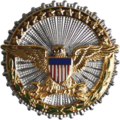Robert W. RisCassi | |
|---|---|
 Robert W. RisCassi as General | |
| Born | 18 January 1936 Hartford, Connecticut, U.S. |
| Allegiance | United States of America |
| Service | |
| Years of service | 1958-1993 |
| Rank | |
| Commands | United States Forces Korea 9th Infantry Division |
| Battles / wars | Cold War Vietnam War |
| Awards | Army Distinguished Service Medal Defense Distinguished Service Medal Legion of Merit Bronze Star (3) |
Robert William RisCassi (born 18 January 1936) is a retired United States Army four-star general who served as Vice Chief of Staff of the United States Army (VCSA) from 1989 to 1990; Commander in Chief, United Nations Command/Commander in Chief, ROK/U.S. Combined Forces Command/Commander, U.S. Forces Korea/Commanding General, Eighth United States Army (CINCUNC/CINCCFC/COMUSFK/CG EUSA) from 1990 to 1992; and Commander in Chief, United Nations Command/Commander in Chief, ROK/U.S. Combined Forces Command/Commander, United States Forces Korea (CINCUNC/CINCCFC/COMUSFK) from 1992 to 1993.






